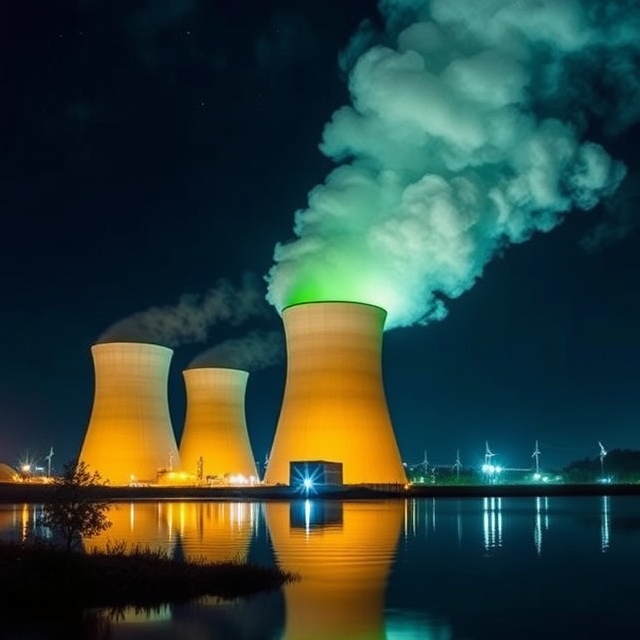Nuclear energy is a powerful and efficient source of energy derived from the nucleus of atoms. This form of energy is produced either through nuclear fission, where atoms are split apart, or nuclear fusion, where atoms are combined. It has become an essential component of the global energy mix due to its ability to generate vast amounts of electricity with minimal greenhouse gas emissions. In this article, we will explore the basics of nuclear energy, its uses, importance, and the challenges it presents.
What is Nuclear Energy?
Nuclear energy originates from the strong forces that bind the nucleus of an atom. There are two primary ways to release this energy:
- Nuclear Fission: This process involves splitting the nucleus of an atom (usually uranium-235 or plutonium-239) into smaller nuclei, releasing energy in the form of heat. This heat is then used to generate electricity in nuclear power plants.
- Nuclear Fusion: In this process, two light atomic nuclei (such as hydrogen isotopes) combine to form a heavier nucleus, releasing a tremendous amount of energy. Fusion is the same process that powers the sun and stars, but it is still in the experimental phase for practical energy generation on Earth.
Uses of Nuclear Energy
Nuclear energy has a wide range of applications across various sectors. Here are some of its key uses:
- Electricity Generation:
- Nuclear power plants use the heat generated from nuclear fission to produce steam, which drives turbines connected to generators.
- Approximately 10% of the world’s electricity is generated by nuclear power.
- Medical Applications:
- Diagnostic Imaging: Radioactive isotopes, such as technetium-99m, are used in imaging techniques like PET scans to detect diseases.
- Cancer Treatment: Radiation therapy uses controlled doses of radiation to destroy cancer cells while minimizing damage to healthy tissues.
- Industrial Applications:
- Radiation is used for non-destructive testing of materials, ensuring the safety and integrity of critical structures.
- Nuclear technology aids in sterilizing medical equipment and food preservation.
- Space Exploration:
- Nuclear energy powers spacecraft and satellites through radioisotope thermoelectric generators (RTGs), which provide long-term, reliable energy for deep-space missions.
- Nuclear energy powers spacecraft and satellites through radioisotope thermoelectric generators (RTGs), which provide long-term, reliable energy for deep-space missions.
- Desalination:
- Nuclear reactors can be used to desalinate seawater, producing fresh water for regions facing water scarcity.
Importance of Nuclear Energy
- Low Greenhouse Gas Emissions:
- Unlike fossil fuels, nuclear power produces minimal carbon dioxide during operation, making it a cleaner alternative in the fight against climate change.
- Unlike fossil fuels, nuclear power produces minimal carbon dioxide during operation, making it a cleaner alternative in the fight against climate change.
- High Energy Density:
- Nuclear energy is incredibly efficient, with one uranium pellet producing as much energy as a ton of coal or 149 gallons of oil.
- Nuclear energy is incredibly efficient, with one uranium pellet producing as much energy as a ton of coal or 149 gallons of oil.
- Reliable Power Supply:
- Nuclear power plants operate continuously, providing a stable and reliable energy source. This is critical for meeting base-load electricity demands.
- Nuclear power plants operate continuously, providing a stable and reliable energy source. This is critical for meeting base-load electricity demands.
- Energy Security:
- Countries with access to nuclear technology and resources can reduce their dependence on imported fossil fuels, enhancing energy independence.
- Countries with access to nuclear technology and resources can reduce their dependence on imported fossil fuels, enhancing energy independence.
- Economic Benefits:
- Nuclear power plants create jobs in construction, operation, and maintenance. They also contribute to local economies through tax revenues.
Challenges and Concerns
Despite its advantages, nuclear energy faces several challenges:
- Nuclear Accidents:
- Incidents such as Chernobyl (1986) and Fukushima (2011) highlight the potential risks associated with nuclear power. These accidents resulted in severe environmental and health consequences, raising concerns about safety.
- Incidents such as Chernobyl (1986) and Fukushima (2011) highlight the potential risks associated with nuclear power. These accidents resulted in severe environmental and health consequences, raising concerns about safety.
- Radioactive Waste Management:
- Spent nuclear fuel and other radioactive materials require secure and long-term storage to prevent environmental contamination. Developing and maintaining such facilities can be costly and politically sensitive.
- Spent nuclear fuel and other radioactive materials require secure and long-term storage to prevent environmental contamination. Developing and maintaining such facilities can be costly and politically sensitive.
- Nuclear Proliferation:
- The dual-use nature of nuclear technology poses a risk of proliferation, where countries or groups might misuse it for developing nuclear weapons.
- The dual-use nature of nuclear technology poses a risk of proliferation, where countries or groups might misuse it for developing nuclear weapons.
- High Initial Costs:
- The construction of nuclear power plants requires significant investment and time, making it less appealing compared to other energy sources like wind and solar.
- The construction of nuclear power plants requires significant investment and time, making it less appealing compared to other energy sources like wind and solar.
- Public Perception:
- Fear and misinformation about nuclear energy can lead to public opposition, influencing policy decisions and hindering its adoption.
Advances in Nuclear Technology
Recent developments in nuclear technology aim to address some of these challenges:
- Small Modular Reactors (SMRs):
- SMRs are compact and more flexible than traditional nuclear reactors. They are cost-effective and can be deployed in remote areas.
- SMRs are compact and more flexible than traditional nuclear reactors. They are cost-effective and can be deployed in remote areas.
- Nuclear Fusion Research:
- Efforts like the ITER project aim to achieve practical nuclear fusion, which promises virtually limitless energy with minimal waste.
- Efforts like the ITER project aim to achieve practical nuclear fusion, which promises virtually limitless energy with minimal waste.
- Thorium Reactors:
- Thorium-based reactors are considered safer and more efficient than uranium reactors, with lower risks of meltdown and waste production.
- Thorium-based reactors are considered safer and more efficient than uranium reactors, with lower risks of meltdown and waste production.
- Waste Recycling:
- Advanced technologies are being developed to recycle spent nuclear fuel, reducing waste and maximizing resource utilization.
The Future of Nuclear Energy
As the world strives to transition to cleaner energy sources, nuclear energy is poised to play a crucial role. Its ability to provide consistent, low-carbon power complements intermittent renewable sources like solar and wind. However, addressing the challenges of safety, waste management, and public acceptance will be critical for its long-term success.
Nuclear energy is also expected to contribute to the development of hydrogen fuel, a clean energy carrier, by providing high-temperature steam for water splitting. Furthermore, innovations in fusion technology and advanced reactors could revolutionize the energy landscape, offering sustainable and nearly inexhaustible power.
Conclusion
Nuclear energy is a potent and indispensable part of the global energy portfolio. Its ability to generate large amounts of electricity with minimal environmental impact makes it an attractive option in the fight against climate change. However, the associated risks and challenges must be carefully managed through stringent safety protocols, technological innovation, and transparent communication with the public.
By addressing these issues, nuclear energy can continue to provide significant benefits for generations to come, contributing to a cleaner, more sustainable, and energy-secure future.




